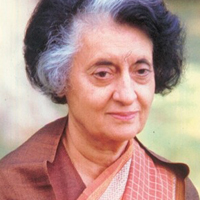Indira Gandhi
Indira Priyadarshini Gandhi was an Indian politician and a central figure of the Indian National Congress. She was the 3rd prime minister of India and was also the first and, to date, only female prime minister of India. Gandhi was the daughter of Jawaharlal Nehru, the 1st prime minister of India.
Indira Priyadarshini Gandhi was an Indian politician and a central figure of the Indian National Congress. She was the 3rd prime minister of India and was also the first and, to date, only female prime minister of India. Gandhi was the daughter of Jawaharlal Nehru, the 1st prime minister of India. She served as prime minister from January 1966 to March 1977 and again from January 1980 until her assassination in October 1984, making her the second longest-serving Indian prime minister after her father.
During Nehru’s premiership from 1947 to 1964, Gandhi was considered a key assistant and accompanied him on his numerous foreign trips. She was elected president of the Indian National Congress in 1959. Upon her father’s death in 1964, she was appointed as a member of the Rajya Sabha (upper house) and became a member of Lal Bahadur Shastri’s cabinet as Minister of Information and Broadcasting. In the Congress Party’s parliamentary leadership election held in early 1966 (upon the death of Shastri), she defeated her rival Morarji Desai to become leader, and thus succeeded Shastri, after his death, as Prime Minister of India.
As prime minister, Gandhi was known for her political intransigency and unprecedented centralisation of power. She went to war with Pakistan in support of the independence movement and war of independence in East Pakistan, which resulted in an Indian victory and the creation of Bangladesh, as well as increasing India’s influence to the point where it became the sole regional power of South Asia. Citing separatist tendencies, and in response to a call for revolution, Gandhi instituted a state of emergency from 1975 to 1977 where basic civil liberties were suspended and the press was censored. Widespread atrocities were carried out during the emergency.[2] In 1980, she returned to power after free and fair elections. After Gandhi ordered military action in the Golden Temple in Operation Blue Star, her own bodyguards and Sikh nationalists assassinated her on 31 October 1984.
In 1999, Indira Gandhi was named “Woman of the Millennium” in an online poll organised by the BBC. In 2020, Gandhi was named by Time magazine among the world’s 100 powerful women who defined the last century.Smt. Indira Gandhi was the daughter of Pt. Jawaharlal Nehru. She studied at prime institutions like Ecole Nouvelle, Bex (Switzerland), Ecole Internationale, Geneva, Pupils’ Own School, Poona and Bombay, Badminton School, Bristol, Vishwa Bharati, Shantiniketan and Somerville College, Oxford. She was conferred Honorary doctoral degree. She got married to Feroze Gandhi on March 26, 1942 and had two sons. Smt. Gandhi became a Member, Congress Working Committee and Central Election of the party in 1955. In 1958 she was appointed as a Member for Central Parliamentary Board of Congress. She was the Chairperson, National Integration Council of A.I.C.C. and President, All India Youth Congress, 1956 and Women’s Dept. A.I.C.C. She became the President, Indian National Congress in 1959 and served till 1960 and then again from January 1978.
She had many achievements to her credit. She was the recipient of Bharat Ratna in 1972, Mexican Academy Award for Liberation of Bangladesh (1972), 2nd Annual Medal, FAO (1973).

Indira Gandhi
Date of Birth: 19 Nov 1917
Birth Place: Prayagraj
Proffession: Former Prime Minister of India
Nationality: Indian
Death: 31 October 1984, New Delhi


